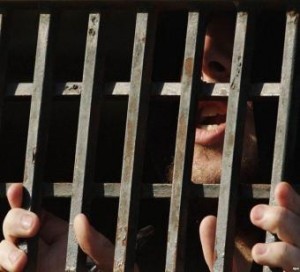Farah’s Name No Longer Means Joy

It was no accident that Farah was wearing black. She stood at the entrance to one of the security services headquarters where her brother was being held.
 His friends had told her he resisted arrest, and only gave up when his head and hands were bleeding.
His friends had told her he resisted arrest, and only gave up when his head and hands were bleeding.
She looked at the guards at the information desk and said, “I’ve come to see you wearing black. Give me my brother’s body to bury it. Or, if he’s still alive, let me see him.”
Farah’s family is one of tens of thousands, even hundreds of thousands of Syrian families who have had a family member arrested, and who receive bad news about their state of health on a daily basis, and sometimes news of their death.
The families are not surprised to hear such talk. Torture is practiced in various forms in detention centres, and sadly fatalities are common. Detainee endure many kinds of torture, increasing in severity until they agree to “confess”. These range from slaps on the face, through beatings on the feet and hand using wooden batons, to electrocution and burning. This generally causes injuries and lasting ill health.
Sometimes detainees go missing, and their families are too afraid to ask about them.
“I can’t enquire about my son’s arrest, not even [through intermediaries] because it would damage my reputation as a judge,” the father of one such detainee said.
Various branches of the security services react differently when asked about detainees in their custody. At the State Security headquarters in Al-Khatib, Damascus, people who come to enquire about their relatives are often arrested themselves. In such cases, relatives avoid raising their concerns in the media, for fear the detainee will be subjected to more torture.
Instead, they may turn to people in power, perhaps relatives of theirs or of their neighbours, to make enquiries as to where the individual is being held, and if possible, about his state of health. They may also obtain this kind of information by paying bribes to the pro-regime “shabbiha” militias that carried out the arrest.
In Syria, the effects of arrest on women are far graver than for men, and relatives live in fear that they are especially vulnerable to physical and psychological pressure.
“I wasn’t subjected to physical torture,” said Dunia (not her real name), who was recently released. “The torture was only psychological – they insulted me and threatened to beat me up – but I was always thinking about how worried my parents would be. It bothered me that they might think I could be raped, and that nothing would reassure them until I was released, safe.”
There are all ages of people detained – children, young adults and elderly – and they come from all social classes and cultural backgrounds.
All experience some form of abuse, whatever their position. Actress May Skaf was arrested during a demonstration of Syrian  intellectuals in Al-Maidan neighborhood in Damascus; physician Jalal Nawfal was recently arrested at a Red Crescent hospital; thinker and writer Salamah Kayleh was arrested and tortured before being deported to Jordan; journalist and activist Mazen Darwich has been held in solitary confinement at Al-Mazzeh military prison for more than four months; staff from of the Syrian Centre for Media and Freedom of Expression are in detention; Yahya al-Shurbaji, a member of the Coordination Committee for Darayya, has been held for more than ten months, with no information about him.
intellectuals in Al-Maidan neighborhood in Damascus; physician Jalal Nawfal was recently arrested at a Red Crescent hospital; thinker and writer Salamah Kayleh was arrested and tortured before being deported to Jordan; journalist and activist Mazen Darwich has been held in solitary confinement at Al-Mazzeh military prison for more than four months; staff from of the Syrian Centre for Media and Freedom of Expression are in detention; Yahya al-Shurbaji, a member of the Coordination Committee for Darayya, has been held for more than ten months, with no information about him.
As a result, when detainees are sent to court, it is, remarkably, seen as a happy event, because then it becomes possible for relatives to see them, find out about their state of health, and rejoice that they are still alive.
This is the hope that keeps Farah – whose name means “joy” – going, and makes her able to stand outside the detention centre where her brother is being held, with the determination to get to see him and find out what condition he is in. She dreams of the day when he will return, the food she will prepare for him, and the chance to replace his torn clothing.
